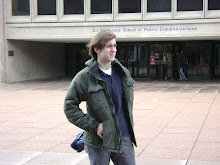
How much life is wasted in wait?
I don't know if the makers of the new Indiana Jones movie intended this remark to be a sly sucker punch to fans who've waited fifteen years for a new Indy film, but it really is an appropriate question. Considering the hype and anticipation behind something like Indiana Jones and the Kingdom of the Crystal Skull, the countless hours of web browsing, trying to find some new information on whether it's just a rumor, and those people who watch and rewatch the trailers to catch details of the film - well, how much life is wasted in those moments?
Depending on how you feel after seeing the new Indiana Jones, the answer could go either way. My reaction is inline with most of the critics I read prior to seeing it: certainly the film has moments missing from the vast majority of action/adventure films the studio's are unleashing on bored thirteen-year-olds this summers (I mean, compared to Speed Racer, Indian Jones is like historical fiction), but at the same time, it seems like Spielberg and Lucas are revisiting territory that they have either outgrown, or that they have completely lost touch with what makes modern movie audiences tick.
Spielberg's been trying to reinvent himself since getting pegged as a fantasy director with films like Raiders and E.T., and of late he's been trying more and more to reflect his dead friend and idol: Stanley Kubrick (there's a moment in this Indy film that has the same eerie atonal choir that scarred me shit-less in 2001.) Spielberg isn't the little kid he was in the seventies and eighties; he probably doesn't play with many toys anymore. And look no further to the deity himself, Lucas, to see someone who so easily perverted what originally was brainless fun. The Star Wars pre-sequels were an embarrassment because they forgot rule number one: if the details and characters are interesting, the overall story doesn't really matter. I could give a rats ass how Anakin became Darth, if you're going to bore me with long codas of dialogue involving things that don't exist.
This franchise doesn't have the luxury of going backwards like the Star Wars series. But that's a good thing, because it leaves more room for play. Harrison Ford, still alive, returns and takes on the persona of Sean Connery, with an aged elegance; but what's lost is the James Bond charisma of the first three swashbucklers. Sure, he can do stunts, but never has Indy seemed more alone and grumpy than in these films. Even with a sidekick and an old flame (Karen Allen doesn't get much screen time to make a case for her return) even Harrison Ford's iconic fedora figure seems to sit backseat to an outlandish plot that attempts to make the move a series of the fifties milieu in-jokes, with enough nostalgic references to confuse a whole bus load of college-prep teens laying down their Alexander Hamiltons.
(Then again, how strange would it have been to have more sexual interplay between an old Harrison Ford and a sly sexual comrade like Cate Blanchett. But at least it would have been strange: Indy's just way too nice in this film, like a nurtured Humphrey Bogart that no longer gets it up when Hepburn enters the room.)
Spielberg never sparks the Rin Tin Tin assembly of kindling he's working with into anything other than a CGI heavy Indiana Jones picture. The best, most clever moments come early on, as the film brings the series into the nuclear age. What's interesting about the opening scene, set in a military test sight for an atomic explosion, is how it makes the Indiana Jones character irrelevant. All he can do is attempt to survive in the unsettling facade of Pleasantville, circa an I Like Ike reference, as it's destroyed. (NY Times made me laugh when I saw the film and remembered her review: Nuclear family indeed.) Indiana Jones movies always provide the message that the world we know is hardly the world that exists beyond the books, and it could be taken as a subversive flip-off to the fan boy crowd that the script is sprinkled with allusions to dangers far more relevant today than the Nazis were to a nineteen-eighties audiences.
Once these moments passed, I was worried. I realized that the film hadn't even begun, and yet at the same time, the best part of it had probably ended. Spielberg gives the audience it's dessert before the veggies, and it tastes gross. I don't even want to get into some of the terrible sequences, that of course would never exist without CGI technology, and that's one reason to wish for days of yore. But, I digress because this is getting too long. No, the new Indiana Jones film is nothing compared to the painful experience of dashed expectations that met views of Phantom Menace. Indiana Jones has enough spirit to make it worth seeing, but it's not streamlined enough to completely work. The real hero, I suppose, ain't Indiana Jones, but the wizards at Lucas Arts who have made an Indy film like no other.
Just don't expect me to thank them for it.


No comments:
Post a Comment